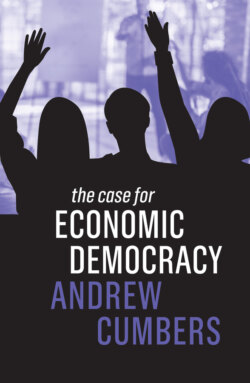Читать книгу The Case for Economic Democracy - Andrew Cumbers - Страница 9
The retreat from democratic scrutiny in economic policy
ОглавлениеThe espousal of neoliberal policy doctrine went hand in glove with the evacuation of democratic decision making from critical spheres of public life – especially economic policy – and their delegation to experts and technocrats. The best example is the tendency for politicians to make central banks ‘independent’. This is generally seen by mainstream media in a positive light. Surely it is just ‘good governance’ to put the setting of interest rates – critical for the wider economy in establishing the terms on which individuals and businesses are able to borrow and invest money – in the hands of ‘independent’ experts rather than interfering politicians? Those experts will take the longer view compared to the short-termist electioneering of career politicians.
Like many superficially compelling tropes, it falls apart under more critical scrutiny. For sure, it is frequently the case that politicians operate on short-term electoral cycles and many are driven by their own political advantage, rather than the greater good of securing sustainable and equitable economic development. Instead, why not let independent experts who have the requisite skills and knowledge take the key decisions for the longer term. But this begs the question: who do these ‘independent experts’ themselves represent? Are they themselves neutral arbiters of the common good? And, how might they make decisions on behalf of a public that is so diverse and multifaceted? While many individual politicians are of course driven by short-term and often quite narrow electoral interests, they are at least in their position because of some form of democratic process.
The argument for independence would have more force if the subsequent expert institutions drew upon a diversity of knowledge, experience and skills, accepting that the economy has many constituent parts, different needs and ways of life. Yet, policy makers are typically drawn from a narrow elite technocratic class rather than being reflective of society as a whole. The current membership of the Bank of England’s Monetary Policy Committee (staffed by eight men and one woman, all of whom are white) can broadly be described as financial elites, four of whom come from the private banking sector (investment rather than retail), one from a career within the Bank of England, two from the UK Treasury and two academic economists, one of whom had previously worked at the Federal Reserve Bank in Boston.
This is an extraordinarily narrow collective world view and in no way reflects the diversity of the United Kingdom, with no representative who can claim to speak for the UK’s minority nations and regions outside of London and the South East. Central bank independence is but one important element of a much broader trend for economic decision making – there is a revolving door between senior economic ministry positions and the financial sector in many countries – to become increasingly concentrated within a narrow elite removed from public scrutiny and democratic control. In the UK, this has meant that the growing dominance of financial activities over the broader economy (Lapavitsas 2013) is exacerbated by the values of the financial class shaping policy in its own image and to its own advantage.
